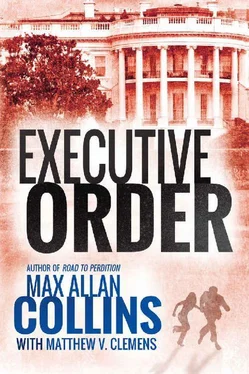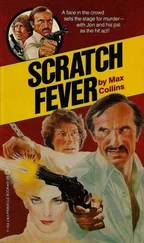Max Allan Collins
Executive Order
FOR ALAN TURKUS
who elected to publish
“In the scheme of our national government, the presidency is preeminently the people’s office.”
Grover Cleveland, twenty-second and twenty-fourth President of the United States of America. Served 1885–1889 and 1893–1897. The only president to be elected to two nonconsecutive terms.
From a hilltop in Azbekistan, through night-vision binoculars, Jake McMann looked down on the Kerch Strait Bridge, wondering if he was about to make history.
That such a detached thought would float through his mind wasn’t unusual — keeping a distance, being outside yourself, was part of any field agent’s makeup. Still, McMann considered himself a genuine student of history — with a Ball State University degree to back it up. And the professional path he’d taken indicated how seriously he took such things.
His short brown hair riffled by the evening breeze, his muscular frame draped in black fatigues, the CIA operative grinned at himself — me making history. Jesus.
But wasn’t he on the front line of a predicted, even inevitable conflict? Why shouldn’t he be seized with the sense that, on this night, he would have the chance to make an entry on the pages of history?
Or anyway a footnote.
Never one to question orders — in or out of uniform, McMann was a soldier — he nonetheless couldn’t help wondering what the hell he and his team were doing in this tiny Crimean Peninsula excuse for a country. All he knew was that they were here to reconnoiter from this position, and wait.
Azbekistan had been just one victim of Russia’s annexing of most of the peninsula back in 2014. The Russians had built the bridge below, from the Taman Peninsula in Krasnodar Krai to Kerch on the Crimean; they’d opened it in 2020, one year behind schedule, back when they still controlled the little country.
Five years later, with mounting threats from the United Nations and determined fighting by Azbekistani rebels, the Russians retreated to their side of the bridge. Now, barely six years later, they threatened to return and overrun Azbekistan yet again. McMann’s four-person team had been sent here to assess the country’s defenses. But why bother? The Russian invasion seemed inevitable, as did the fall of Azbekistan (again).
The strait wasn’t that wide here, less than three miles, and McMann thought he heard some kind of noise echoing off the water; but with the swirling wind, he couldn’t pick it out.
Turning, he looked down the hill to the south. He saw nothing, at first. Pulling on his night-vision goggles, he spotted two men climbing the slope to join him.
The taller, almost spindly one — Willie Meeks, McMann’s partner — was an African American agent from Villa Rica, Georgia, a sleepy suburb of Atlanta. McMann and Willie were called Ebony and Ivory by their peers back at Langley, but McMann supposed that was better than Salt & Pepper, which similar duos had been christened back in the Agency’s glory days in the 1960s and ’70s — back when black agents in the CIA were more rare than female ones, and there weren’t ten of those.
Next to Meeks, Vitor Gorianov — one of the two analysts they’d been sent here to protect — was an American of Crimean descent, and also their translator. Craggy, and burlier than Meeks, Gorianov also knew his way around an AK-47, which was a nice bonus in circumstances like these.
As the men neared, also attired in black, night-clinging fatigues, McMann eased the goggles back up to his forehead.
“Where’s Liz?” Gorianov asked, in a near whisper, knowing voices really carried out here at night.
The fourth member of the team, Liz Gillis — the other analyst, blonde, blue-eyed, boyishly attractive — was not yet thirty, but knew her shit.
“She went for a walk,” McMann said, also sotto voce.
“A walk?” Meeks asked, almost too loud. He caught himself. “You let that fresh-faced analyst go off on her own, in the wild?”
McMann met his partner’s eyes. “She can take care of herself, Willie.”
“In what could be a fuckin’ war zone any time now? Jake, get serious — she’s just a goddamn analyst.”
From behind Meeks and Gorianov, a confident female voice came, softly: “A goddamn analyst who’s got the drop on you three.”
They all wheeled toward her. Her blonde hair tucked under a black watch cap, Gillis stood there grinning. She was tall, almost willowy, yet the AK-47 looked perfectly at home in her delicate hands, its snout lowered but ready.
Gorianov, his words clipped, asked, “What the hell were you doing out there?”
“My job,” Liz snapped.
“Keep your voices down!” Meeks said, too loud.
McMann held up a hand and said, “Okay, everybody — unbunch your panties. Chill already.”
He waited while they all took a breath.
The entire team was tense, including McMann, and why not? The Russians seemed poised to invade, and Azbekistan appeared almost ready and willing for them to do so.
Which was damn dumb: the Azbekistani army was not exactly intimidating, despite fancy new uniforms. As rebels, citizens fighting for their homeland, they had been tenacious pit bulls; as an organized, under-equipped army standing up against an overwhelming enemy, they were more like lapdogs.
But at least they would look sharp as they got slaughtered.
McMann asked, “What did you find, Liz?”
“The Azbekistanis are sound asleep. Except for the ones just napping.”
“Vitor?” McMann asked.
“Same thing to the south. Maybe they think they can dream the Russians away.”
“Where’s the closest Azbekistani force?”
Meeks said, “Other than that glorified bridge tollbooth? A two-jeep patrol about a click away.”
As they headed back toward their vehicle, a thought kept gnawing at the front of McMann’s mind: Why are we here? Everybody in the CIA, not excluding the agent at the desk in the lobby at Langley, knew this invasion was coming, and that the Azbekistanis were about to get rolled over. His four-person team could hardly prevent that inevitability.
So why the hell were they here?
They were still nearly a thousand yards to the trees where their car, a Skoda Citigo, was hidden, just off a back road, when the wind shifted and McMann suddenly heard distant thunder — or was it?
The sounds were low-pitched, but as the wind brought them to him, he knew — no, not thunder . Spinning, he pulled down his night-vision goggles and trotted over to where he could look back down toward the bridge.
Tanks.
A whole damn column of them, already better than halfway across.
“Damn!” McMann blurted. “It’s on — the Russians are on the move! Right the hell now!”
All four of them sprinted toward the car. McMann ran hard, but some detached part of his mind recalled the Nazis storming across the border of Poland in 1939. Just up ahead were the two jeeps that Gorianov and Meeks had spotted earlier, lumbering toward them. For a second, McMann wondered if his little team would end up pinned down between the two sides.
But the Russians were still a few clicks away, and the four of them would be long gone by the time the tanks rumbled through. That thought gave him some relief.
Some.
Running just behind him, like a relay man about to pass a baton, Meeks yelled, “You hear that?”
Until now — lost in his immediate thoughts of escape and his reflective flashes about the history they were in the middle of — McMann hadn’t; but now he did — a low-pitched rumble, different from the tanks. But he didn’t turn and he didn’t slow as he sprinted through darkness across uneven ground, only then the noise was right above him, and he risked a glance skyward.
Читать дальше












